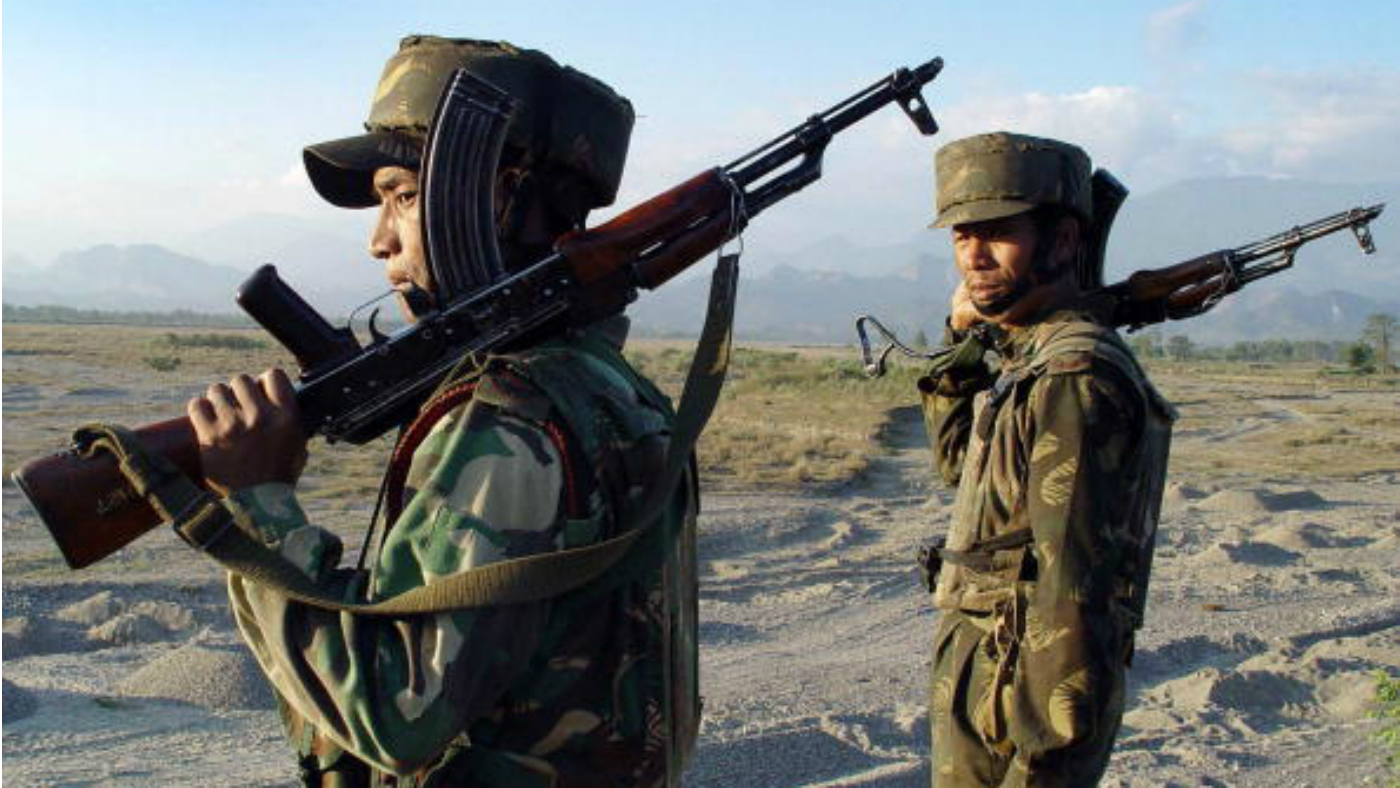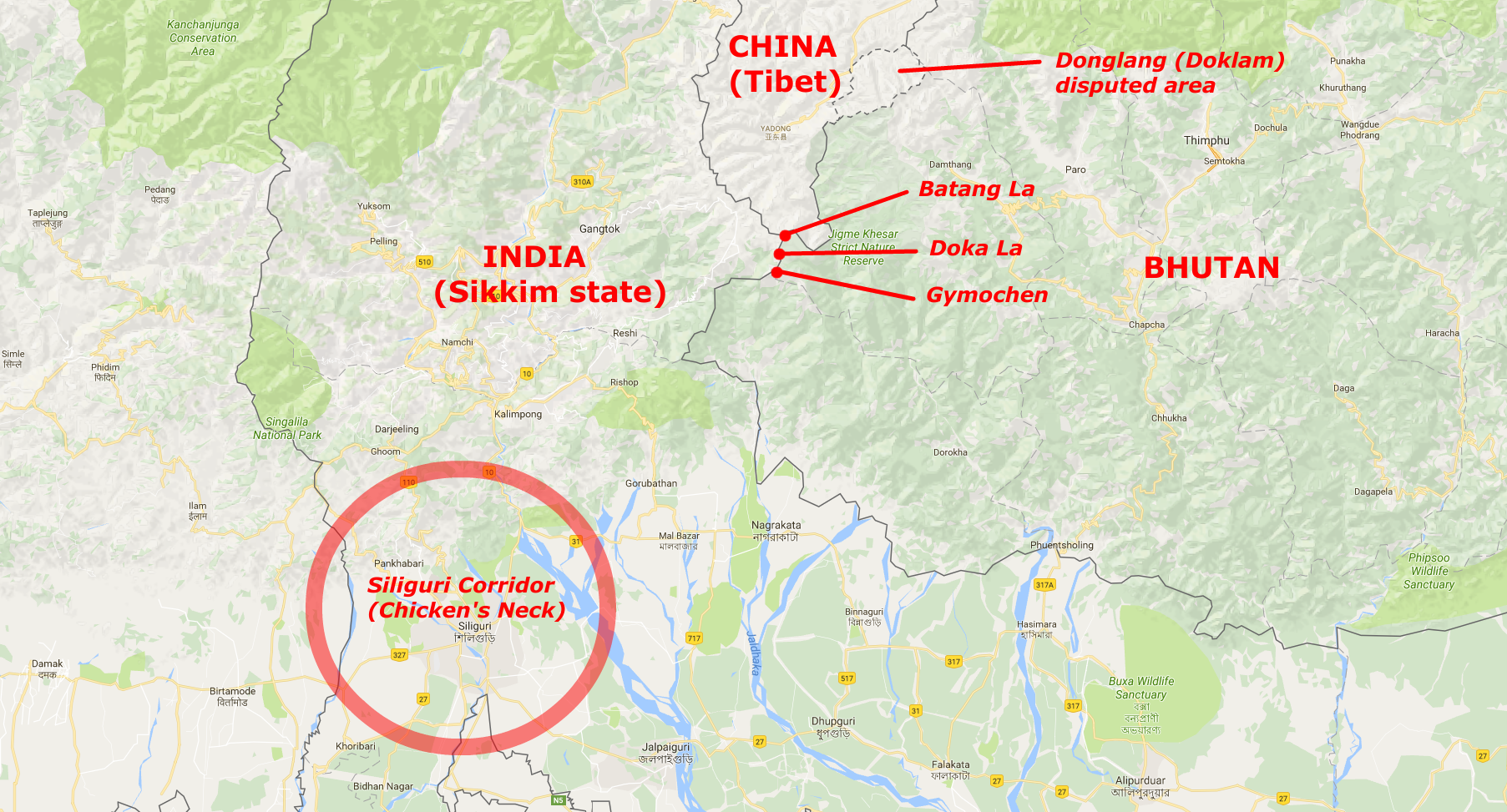China and India square up over Himalayan dirt road
How an obscure 'motorable track' has brought two nations to the edge of conflict

A free daily email with the biggest news stories of the day – and the best features from TheWeek.com
You are now subscribed
Your newsletter sign-up was successful
A dirt road in a desolate mountain pass high in the Himalayas between China and India has sparked "one of the worst border disputes between the nuclear-armed rivals in more than 30 years", says Al Jazeera.
In June, China crossed into territory that Bhutan claims as its own while extending a road in Donglang, a remote plateau on the three-way border between the two countries and India, which knows the area as Doklam.
At Bhutan's request, Indian troops crossed the border to stop the construction and "formed a human chain to physically prevent the Chinese from working", says the Indian Express.
The Week
Escape your echo chamber. Get the facts behind the news, plus analysis from multiple perspectives.

Sign up for The Week's Free Newsletters
From our morning news briefing to a weekly Good News Newsletter, get the best of The Week delivered directly to your inbox.
From our morning news briefing to a weekly Good News Newsletter, get the best of The Week delivered directly to your inbox.
They are still there, six weeks later, and Beijing's patience appears to be wearing thin.
"India is still not only illegally remaining on Chinese territory, it is also repairing roads in the rear, stocking up supplies, massing a large number of armed personnel," the foreign ministry said. "This is certainly not for peace."
Beijing called for India to "immediately and unconditionally withdraw its trespassing border troops" back to their side of the border.
"No country should ever underestimate the resolve of the Chinese government and people to defend China’s territorial sovereignty," it added.
A free daily email with the biggest news stories of the day – and the best features from TheWeek.com
India denies any military build-up and says its troops are there as part of its 2007 treaty with Bhutan committing the two nations to support one another's national security interests, says The Hindu.
Nevertheless, while the disputed road is no more than what the Indian Express calls a "motorable track", its significance for India goes much deeper than neighbourly solidarity. China's maneouevres are widely seen in New Delhi as brazen jockeying to spread Beijing's influence towards vulnerable part of its own country.

Defiant opinion pieces in Indian newspapers urge the government to stand its ground against "unilateral action by Beijing to change the status quo in the area", as the Times of India puts it.
In the meantime, diggers and bulldozers sit empty, while Chinese and Indian troops stand "eyeball-to-eyeball" in a cold and lonely standoff 1,300ft above sea level.
Road to nowhere
The mountainous frontier between Bhutan and China is difficult to define. Despite 24 rounds of talks since the 1980s, both countries still lay claim to multiple areas along the western border.
A previous deal saw them agree not to make any moves in any of the disputed territories, but China's apparent attempt to redraw its border with Bhutan has set alarm bells ringing - and not just in Thimphu.
Both Bhutan and India maintain that the junction between the three nations is located at a mountain pass called Batang La. China claims it lies four miles south, at Gymochen peak, where its planned road will end.
The current road from Tibet stops almost halfway between those two points, at a mountain pass called Doka La.
Fears for the future
For India, a Chinese-controlled route to Gymochen would represent a power creep that would bring Beijing's sphere of control unacceptably close to home.
With the new road, China would be well placed to expand south-east along the Jampheri Ridge, a strategically vital piece of high ground which looks down over the foothills of southern Bhutan towards the "Chicken's Neck" - a narrow strip of land linking mainland India to its seven north-eastern states.
"If the Chinese gain control of the Donglang region, they will hold a commanding position in the Chumbi Valley and would gain the ability to essentially cut off India’s access to the northeastern states in case of a conflict," says The Diplomat.
Border skirmishes were once a common occurrence along the 2,520-mile frontier zone, the most notable of which was the month-long Sino-Indian War of 1962. Trading partnerships have led to a thaw in diplomatic relations between the two nations.
This time, however, international observers are concerned that "a solution that allows both sides to 'save face' is not immediately visible", says Indian Express. With both sides ramping up the rhetoric, "the space for a honourable disengagement appears to be shrinking".
China Daily, the official English-language newspaper, said that while Beijing was not in the mood for a fight, India should not read anything into the "unusually restrained" standoff.
"If good manners do not work, in the end, it may be necessary to rethink our approach. Sometimes a head-on blow may work better than a thousand pleas in waking up a dreamer," it said.
-
 The environmental cost of GLP-1s
The environmental cost of GLP-1sThe explainer Producing the drugs is a dirty process
-
 Greenland’s capital becomes ground zero for the country’s diplomatic straits
Greenland’s capital becomes ground zero for the country’s diplomatic straitsIN THE SPOTLIGHT A flurry of new consular activity in Nuuk shows how important Greenland has become to Europeans’ anxiety about American imperialism
-
 ‘This is something that happens all too often’
‘This is something that happens all too often’Instant Opinion Opinion, comment and editorials of the day
-
 Epstein files topple law CEO, roil UK government
Epstein files topple law CEO, roil UK governmentSpeed Read Peter Mandelson, Britain’s former ambassador to the US, is caught up in the scandal
-
 Iran and US prepare to meet after skirmishes
Iran and US prepare to meet after skirmishesSpeed Read The incident comes amid heightened tensions in the Middle East
-
 EU and India clinch trade pact amid US tariff war
EU and India clinch trade pact amid US tariff warSpeed Read The agreement will slash tariffs on most goods over the next decade
-
 Israel retrieves final hostage’s body from Gaza
Israel retrieves final hostage’s body from GazaSpeed Read The 24-year-old police officer was killed during the initial Hamas attack
-
 China’s Xi targets top general in growing purge
China’s Xi targets top general in growing purgeSpeed Read Zhang Youxia is being investigated over ‘grave violations’ of the law
-
 Panama and Canada are negotiating over a crucial copper mine
Panama and Canada are negotiating over a crucial copper mineIn the Spotlight Panama is set to make a final decision on the mine this summer
-
 Why Greenland’s natural resources are nearly impossible to mine
Why Greenland’s natural resources are nearly impossible to mineThe Explainer The country’s natural landscape makes the task extremely difficult
-
 Iran cuts internet as protests escalate
Iran cuts internet as protests escalateSpeed Reada Government buildings across the country have been set on fire